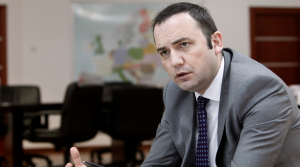Deputy Prime Minister of the former Yugoslav Republic of Macedonia (FYROM) Bujar Osmani in an interview with IBNA, just before embarking on an official visit to Athens, stated that the next period for the country is one of “to be or not to be.” At the same time, Osmani sent a message to the political parties in the country not to abuse this process for daily political points, stressing that the official visit to Athens is in the midst of building mutual trust for a final solution to the name dispute.
January is an important month for the Euro-Atlantic agenda of the country, and the scheduled meeting between Prime Minister Zaev and his colleague Tsipras is in this context, too. You are going to Athens as well. What are your expectations?
“We have repeatedly mentioned that the next six months are a historic opportunity for FYROM (note: “Republic of Macedonia” in the interview, FYROM henceforth) to make a serious step forward in the Euro-Atlantic agenda and finally to close the issue of NATO membership and open the prospect of accession negotiations for EU membership. In this sense, January is an extremely important period that should end with the publication of the European Commission’s Strategy for the Enlargement of the Union 2025 planned for the beginning of February, and where we expect FYROM to get a well-deserved place. At the same time, we have a great amount of work to do at home: implementation of reforms in key areas related to the judiciary, security services reform, and public administration reform, while not forgetting about other areas such as the media, civil society, the fight against terrorism and extremism, etc. Certainly, we will work in parallel to building confidence with Athens as a unique opportunity to achieve an atmosphere in which we can close the name dispute. It is a co-ordinated government policy. Thus, my visit to Athens will take place in this framework.”
Will you go there with a specific proposal (name)?
“No. Negotiations about the differences over the name have their own framework and trajectory. At this moment, our primary goal is to further intensify the communication between Skopje and Athens, while honestly devoting ourselves to confidence-building measures among our close and friendly societies. Each visit to Athens by our government officials, and vice versa, the visits to Skopje by top state officials from Athens represent a positive contribution to the construction of more relaxed relations, a new positive approach in mutual communication that ultimately should result in increased confidence not only among the political representatives, but, in general, greater trust among the peoples, citizens, businessmen, and overall, greater trust among the societies. It is only in such an atmosphere that an attempt is made to find a mutually acceptable solution to the name differences, which, I believe, will result in the next period.”
Is Democratic Union for Integration (DUI) still in support of the view that this issue can be resolved through the legislature and not through a referendum?
“This is already the third step, once we first build trust and we will harmonize a mutually acceptable solution. At this point, we should not allow the issue of a referendum to burden this already complex process, and at least abuse that issue for daily political goals. I think that this burden of the process with additional elements in the past has been an obstacle to progress and I expect, in this period, greater maturity and responsibility from all influential social stakeholders. Of course, the possible solution will not be ad hoc, but there will be wider verification by the whole society. However, at the moment, it is counterproductive to burden the process with that issue.”
Greek media said that Zaev is expecting a meeting with Tsipras this month in Davos. Are you preparing the grounds for the announced meeting?
“The two Prime Ministers already had contacts, and as far as I know, they are in a positive atmosphere and are towards the right direction. It is important that we have established regular communication with Athens and, in the forthcoming period, I expect such contacts, visits and meetings to become more frequent.”
What will be the next steps after this meeting?
“As I mentioned, by the end of January we will be focused on delivering results in key areas, prior to the launch of the Enlargement Strategy for the Western Balkans by 2025, by the European Commission in early February. But, the implementation of the reforms and the removal of political obstacles continue with an unprecedented momentum in the upcoming period, to the European Commission’s regular report on FYROM in April, which we should try to be the best so far, but further throughout the year. I’d like to point out that the reforms are an integral part of the process of FYROM’s integration into the European Union and are part of the accession negotiations, and that process will last for many years. The removal of the conditionality of the recommendation may have happened earlier, in February, but, in any case, all this should finish with a specific Declaration of the historic summit of the European Council for Enlargement in May, in Sofia, which will conclude the European perspective of FYROM, but also of the other countries of the Western Balkans. At the end of these six months, in June, it is the regular Council of the European Union, when, in accordance with the success of the process, we expect a decision to start negotiations on FYROM’s full membership in the EU by the European Council”.
Source: balkaneu.com
Ask me anything
Explore related questions





